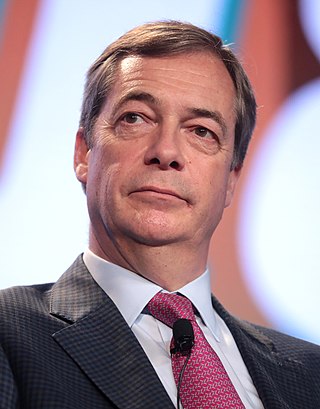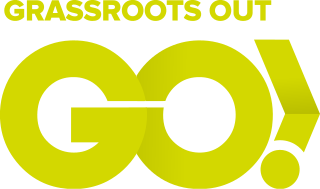
The UK Independence Party is a Eurosceptic, right-wing populist political party in the United Kingdom. The party reached its greatest level of success in the mid-2010s, when it gained two members of parliament and was the largest party representing the UK in the European Parliament. The party is currently led by Neil Hamilton.

John Douglas Wilson Carswell is a British former politician who served as a Member of Parliament from 2005 to 2017, co-founded Vote Leave and currently serves as president and CEO of the Mississippi Center for Public Policy.

Euroscepticism in the United Kingdom is a continuum of belief ranging from the opposition to certain political policies of the European Union to the complete opposition to the United Kingdom’s membership of the European Union. It has been a significant element in the politics of the United Kingdom (UK). A 2009 Eurobarometer survey of EU citizens showed support for membership of the EU was lowest in the United Kingdom, alongside Latvia and Hungary.

On 23 June 2016, a referendum, commonly referred to as the EU referendum or the Brexit referendum, took place in the United Kingdom (UK) and Gibraltar to ask the electorate whether the country should remain a member of, or leave, the European Union (EU). The referendum resulted in 51.9% of the votes cast being in favour of leaving the EU, triggering calls to begin the process of the country's withdrawal from the EU commonly termed "Brexit".

Brexit was the withdrawal of the United Kingdom (UK) from the European Union (EU). Following a referendum on 23 June 2016, Brexit officially took place at 23:00 GMT on 31 January 2020. The UK is the only sovereign country to have left the EU. The UK had been a member state of the EU or its predecessor, the European Communities (EC), since 1 January 1973. Following Brexit, EU law and the Court of Justice of the European Union no longer have primacy over British laws. The European Union (Withdrawal) Act 2018 retains relevant EU law as domestic law, which the UK can amend or repeal.
Arron Fraser Andrew Banks is a British businessman and political donor. He is the co-founder of the Leave.EU campaign. Banks was previously one of the largest donors to the UK Independence Party (UKIP) and helped Nigel Farage's campaign for Britain to leave the EU.

The European Union Referendum Act 2015 was an Act of the Parliament of the United Kingdom that made legal provision for a consultative referendum to be held in the United Kingdom and Gibraltar, on whether it should remain a member state of the European Union or leave the bloc altogether. The Bill was introduced to the House of Commons by Philip Hammond, Foreign Secretary on 28 May 2015. Two weeks later, the second reading of the Bill was supported by MPs from all parties except the SNP; the Bill subsequently passed on its third reading in the Commons on 7 September 2015. It was approved by the House of Lords on 14 December 2015, and given Royal Assent on 17 December 2015. The Act came partly into force on the same day and came into full legal force on 1 February 2016.

The 2019 European Parliament election was the United Kingdom's component of the 2019 European Parliament election. It was held on Thursday 23 May 2019 and the results announced on Sunday 26 and Monday 27 May 2019, after all the other EU countries had voted. This was the United Kingdom's final participation in a European Parliament election before leaving the European Union on 31 January 2020, and was also the last election to be held under the provisions of the European Parliamentary Elections Act 2002 before its repeal under the European Union (Withdrawal) Act 2018.

Vote Leave was a campaigning organisation that supported a "Leave" vote in the 2016 United Kingdom European Union membership referendum. On 13 April 2016 it was designated by the Electoral Commission as the official campaign in favour of leaving the European Union in the Referendum.

Britain Stronger in Europe was an advocacy group which campaigned in favour of the United Kingdom's continued membership of the European Union in the 2016 British referendum. It was launched at the Old Truman Brewery in London on 12 October 2015, and declared as the official "Remain" campaign for the referendum by the Electoral Commission on 13 April 2016.
Leave.EU was a political campaign group that was first established to support the United Kingdom's withdrawal from the European Union in the June 2016 referendum. Founded in July 2015 as The Know, the campaign was relaunched in September of that year with its name changed to "Leave.eu" to reflect altered wording in the referendum question.

Labour Leave is a Eurosceptic campaign group in the United Kingdom. The group is unofficially affiliated with the Labour Party, and campaigned for the United Kingdom to vote to withdraw from the European Union, in the June 2016 EU Referendum. The group was led by eurosceptic Labour MPs: Graham Stringer, Kelvin Hopkins, and Roger Godsiff.

Grassroots Out (GO) was an organisation funded by Arron Banks that campaigned in favour of EU withdrawal in the 2016 referendum on EU membership in the United Kingdom. The organisation was formed in January 2016, as a result of infighting between Vote Leave and Leave.EU, and officially launched on 23 January 2016 in Kettering.

The European Union (Referendum) Act 2016 was an Act of the Gibraltar Parliament, which implements the United Kingdom's European Union Referendum Act 2015 in Gibraltar. It was the first time a referendum has been held in Gibraltar on the issue of continued EU membership since the territory joined along with the United Kingdom in 1973 and was the first time that any British Overseas Territory had participated in a UK-wide referendum. The Act commenced on 26 January 2016, and received assent from the Governor of Gibraltar on 28 January 2016.
After the British EU membership referendum held on 23 June 2016, in which a majority voted to leave the European Union, the United Kingdom experienced political and economic upsets, with spillover effects across the rest of the European Union and the wider world. Prime Minister David Cameron, who had campaigned for Remain, announced his resignation on 24 June, triggering a Conservative leadership election, won by Home Secretary Theresa May. Following Leader of the Opposition Jeremy Corbyn's loss of a motion of no confidence among the Parliamentary Labour Party, he also faced a leadership challenge, which he won. Nigel Farage stepped down from leadership of the pro-Leave party UKIP in July. After the elected party leader resigned, Farage then became the party's interim leader on 5 October until Paul Nuttall was elected leader on 28 November.
The result in favour of Brexit of the 2016 United Kingdom European Union membership referendum is one of the most significant political events for Britain during the 21st century. The debate provoked major consideration to an array of topics, argued up-to, and beyond, the referendum on 23 June 2016. The referendum was originally conceived by David Cameron as a means to defeat the anti-EU faction within his own party by having it fail, but he misjudged the level of public support for leaving, particularly amongst Labour Party voters. Factors included sovereignty, immigration, the economy and anti-establishment politics, amongst various other influences. The result of the referendum was that 51.8% of the votes were in favour of leaving the European Union. The formal withdrawal from the EU took place at 23:00 on 31 January 2020, almost three years after Theresa May triggered Article 50 of the Lisbon Treaty on 29 March 2017. This page provides an overarching analysis of the different arguments which were presented by both the Leave and Remain campaigns.
A by-election for the House of Commons constituency of Sleaford and North Hykeham in Lincolnshire, England, was held on 8 December 2016. It was triggered by the resignation of the Conservative member of parliament (MP) Stephen Phillips, who left Parliament on 4 November 2016 due to policy differences with the Conservative government led by the prime minister, Theresa May, over Brexit – the British withdrawal from the European Union (EU). The Conservatives nominated Caroline Johnson, a paediatrician, to replace Phillips; she won the by-election with more than 50 per cent of the vote, a sizable majority. The Conservatives' vote share fell slightly compared to the result at the previous general election in 2015.

The United Kingdom was a member state of the European Union (EU) and of its predecessor the European Communities (EC) – principally the European Economic Community (EEC) from 1 January 1973 until 31 January 2020. Since the foundation of the EEC, the UK had been an important neighbour and then leading member state, until Brexit ended 47 years of membership. During the UK's time as a member state two referendums were held on the issue of its membership, with the first being held on 5 June 1975, resulting in a vote to stay in the EC, and the second, held on 23 June 2016, which resulted in the vote to leave the EU.
Several allegations of unlawful campaigning in the 2016 EU referendum have been made. Some allegations were dismissed by the investigating bodies, but in other cases wrongdoing was established, leading to the imposition of penalties. Sanctions have included the levying of the maximum fine possible on Facebook for breaches of data privacy.















